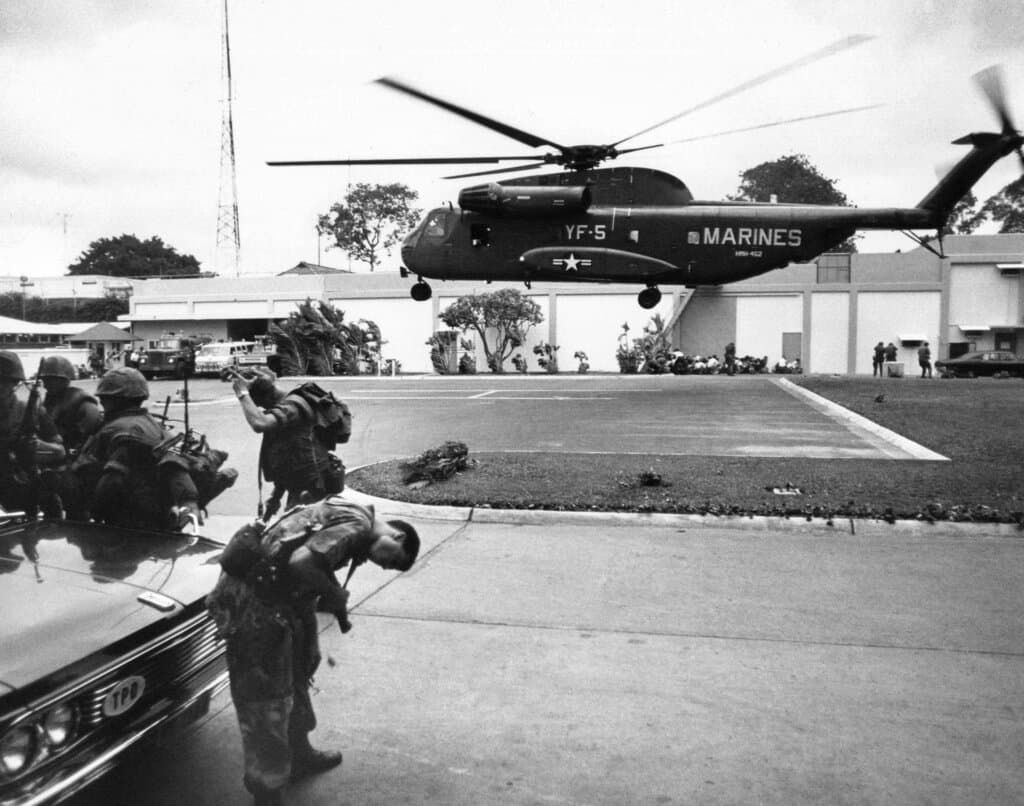Vietnam, Afghanistan — and Iraq?
The grainy footage we’re now seeing of unrest at the Green Zone at Baghdad conjures the scramble at Saigon to rescue Vietnamese soldiers and families who sided with us during the war there.

The video that went up on the web Monday of an American helicopter hovering over the embassy at Baghdad will prompt Americans to wonder if Iraq is going to end up as another Vietnam — or Afghanistan. It conjures the scramble at Saigon to rescue Vietnamese soldiers and families who sided with us during the war and to airlift them to freedom with helicopters that landed on the grounds and roof of our embassy at Saigon.
Does the grainy footage we’re now seeing from the Green Zone at Baghdad presage the beginning of the fall of Iraq? “There’s no evacuation going on at the embassy and no indication that’s going to be required at this time,” says a National Security Council spokesman. Then again, too, that’s what President Biden said about helicopters at Kabul, a few weeks before his surrender of Afghanistan precipitated Kabul into chaos.
It is one of the most memorable moments of Mr. Biden’s presidency. In televised remarks, he stood in the East Room of the White House to assure Americans that “there is going to be no circumstance where you see people being lifted off the roof of an embassy of the United States from Afghanistan.” Within a month, events put the lie to Mr. Biden’s promises, as the Taliban seized Kabul in a fell swoop.
The implosion of the Afghan military, and government, marked not only the nadir of the Biden administration’s foreign policy, but a humiliation for America that surely did not go unnoticed in Moscow, Tehran, and Beijing. Yet our State department insisted to the end “This is not an abandonment. This is not an evacuation. This is not the wholesale withdrawal. What this is is a reduction in the size of our civilian footprint.”
That diplomatic dissembling fooled none of the thousands of America’s Afghan allies, who fought along with our troops in the 20-year struggle to liberate the nation from Islamist tyranny. They were largely abandoned as Americans fled. Even now, many remain at high risk of reprisal. It’s telling that American veterans, and not the Biden administration, are leading efforts to rescue them from the peril they face there.
The fall of Kabul was a human tragedy, for the Afghans, and a geopolitical disaster, for America. It’s not yet clear what the events unfolding at Baghdad portend for the Iraqis or the United States. Our Benny Avni reports that the “deadly clashes” in the capital’s Green Zone “erupted” after “Iraqi supporters of an anti-Iranian nationalist,” Muqtada al-Sadr, stormed there the heavily secured government compound.
Mr. al-Sadr — though an enemy of America — deserves some credit at the moment for “leading a fight against government corruption and, notably, against Tehran’s interference in Baghdad politics,” Mr. Avni reports. The unrest at the capital appears to be driven by frustration with Tehran’s efforts, using “its proxy Shiite politicians and armed militias,” to keep Mr. Al-Sadr from forming a coalition government that would stand up for Iraq against Iran.
In any event, the United Nations mission in Iraq describes the situation as “an extremely dangerous escalation,” warning that a decisive moment could be ahead. “Respect for constitutional order will now prove vital.” Conflict between forces loyal to Iraq and those loyal to Iran has been “brewing for months,” Mr. Avni writes, and “America was all but asleep at the wheel.” Where has Mr. Biden been while Iraq’s domestic politics degenerated?
It turns out — incredibly — that Mr. Biden has been bent on securing articles of appeasement with Iran. Mr. Biden suggests that the region has been “more stable and secure” than during President Trump’s tenure. Mr. Avni’s point is that strategic diplomacy could have aimed for an anti-Iran alliance among Iraq’s political factions. Yet after Kabul’s fall, strategic insight is the last thing we expect from President Biden and the Democrats.

